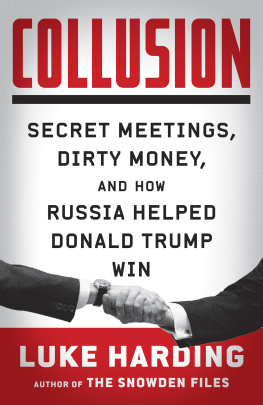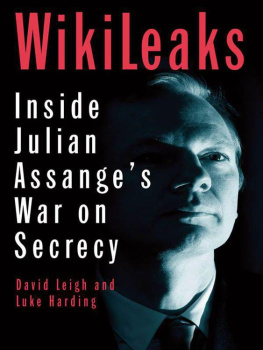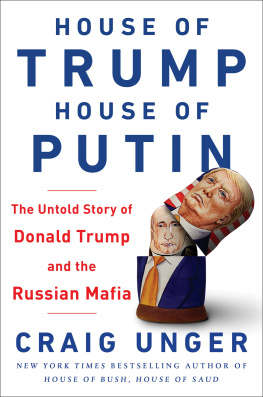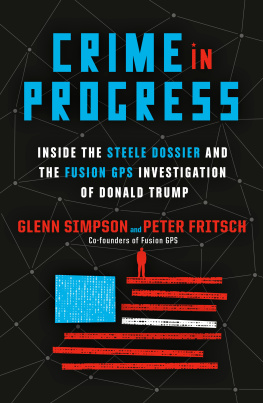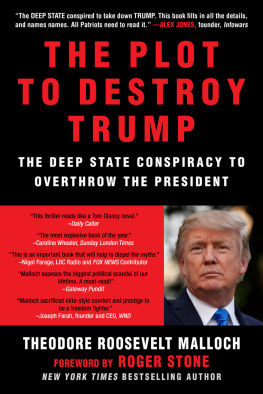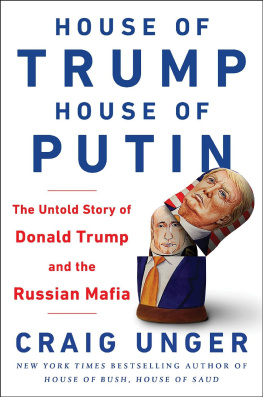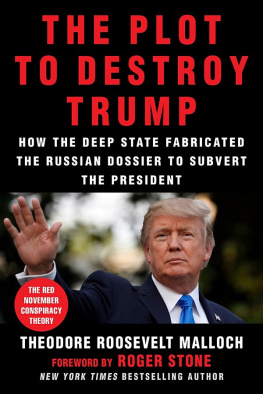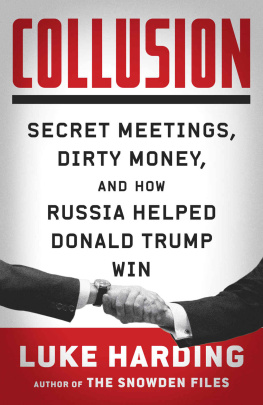EPILOGUE
2017?
Washington, D.C.Moscow
Jerk-off artists, playing jerk-off games, thinking youre the biggest fucking wise guys in the universe. Youre nothings, hear me!
JOHN LE CARR , A Legacy of Spies
On the eve of his first year in office, Trumps achievements were few. In fact, it was hard to think of any. There was plenty of noise: tweets on immigration and tax reform, speeches to his loyal base, and personal insults thrown at North Koreas dictator, Kim Jong-un. But nothing that might heal America, restore common values, or soothe the countrys painful racial and cultural divide.
His White House was beset by problems. Most were self-created. Even Trumps natural allies were struggling. Relations between Trump and Senator Mitch McConnell, the Republican majority leader, were so bad that they were no longer speaking. The president repeatedly berated Congress, too.
Trumps Republicans controlled both houses, but he was surely the weakest president of modern times. Much of his personal energy went into fighting gratuitous battles. He was at odds with his staff, big business, the National Football League, the U.S. intelligence community, and the FBI.
It was this last institution that posed a mortal threat to Trump. Robert Muellers investigation was moving aggressively forward. The bureau leaks that characterized the first half of 2017 had pretty much dried up. It was difficult to be sure, but Mueller seemed to be proceeding with a determination, a ruthlessness even, that boded ill for the president. Nothing less than the FBIs credibility was at stake.
Certainly, it looked bad for Trumps lieutenants. It was clear that both Paul Manafort and Michael Flynn were now major targets. Muellers strategy seemed designed to unnerve them both. The special prosecutor had reportedly targeted Flynns son and former chief of staff, Michael Flynn, Jr., with a subpoena. This was a classic bare-knuckle prosecutorial tacticgo after the son to step up pressure on Dad.
Seemingly, the goal was to get Flynn to cooperate. For Flynn to receive immunity, he would have to provide information that materially advanced the case against people higher up the chain of command. That meant Trump. Of course, Trump might pardon Flynn. But, as constitutional lawyers noted, Trump could not issue a pardon for an improper reason or to frustrate justice.
Meanwhile, Manaforts woes piled up. Further subpoenas were issued, covering his lawyer and prominent D.C. lobbying firms with which he had worked on the Ukraine brief. Humiliating details emerged of the FBIs predawn raid on his home. The agents picked the locks, burst in with weapons drawn, and even patted down Manaforts bleary-eyed wife, Kathleen, CNN reported. This physical roughness was normally reserved for cases of organized crime or treason.
Another Mueller target, Carter Page, announced that he would plead the Fifth Amendment. His desire not to self-incriminate was understandable. Were he to testify before Congress, he might say something at odds with records of his private conversations, bugged by the FBI and now in the hands of the U.S. government.
Trumps lawmaking achievements, meanwhile, were scant. There was one piece of significant legislation, but one Trump had bitterly opposed. On August 2, 2017, he had been forced to sign into law the new sanctions against Moscow, after a near-unanimous vote in the Senate and House. The act could be revoked only with Congresss approval. The prospect of a Trump administration lifting sanctions on Russia had disappeared.
For Vladimir Putin, this was a profound setback. The Kremlins campaign to help Trump win the White House had a primary goal. That was to bring about an end to Americas economic embargo. (The secondary aim was to shove a finger in the United States preexisting social and ideological wounds. This had succeeded well enough.)
Putins operation was bold, cocky even. It involved cyber hacking, fake Facebook accounts, and classic KGB techniques of deceit and cultivation. But it had backfired, you might argue. Kremlin officials often imagined America to be a mirror copy of Russia. They had a poor understanding of U.S. institutional politics. They failed to appreciate the separation of powers or the constraints on a presidentany president.
Wiser voices inside the Russian administrationfired chief of staff Sergei Ivanov and U.S. ambassador Sergey Kislyak, now recalled to Moscowhad been right. As with Putins 2014 invasion of Ukraine, intervening in the 2016 U.S. presidential election had been a tactical triumph and a strategic disaster. The consequences for Russias economy were lasting. It remained shut out from cheap Western credit.
Were it not for Steeles dossier, Trump would have lifted sanctions and created a new alliance with Russia, Chris Steele believed. As one friend put it: Chris stole a great strategic victory from right under Putins nose. Steeles motivations werent connected to politics or ego. Rather, it was about uncovering the truth and public service, the friend said. At some point Steele may want to tell his own story.
It was an open question as to when the dossier would be proven up, Steele added to friends. The Kremlin had had a year to cover up all traces of its operation. It had done this successfully. In contrast to D.C., Russian officials didnt leak; journalists based in Moscow had struggled to find original material. There were quite a few people still alive and kicking who knew significant things, but they were not likely to come forward anytime soon, Steele thought.
These people included ex-KGB officers with knowledge of historic plots. There were paper records, too: typically loose-leaf folders with documents arranged in chronological order. Does the Trump file still exist? The chatter in Moscow is that Putin has grown so paranoid that any incriminating material will have been destroyed or hidden in his safe. Certainly, the Soviet-era file on Steele, compiled when he was a junior embassy spy, will now be much enhanced.
Inside Russia, change looks unlikely. In 2017 Putins stint in power (including his spell as prime minister, when he remained in charge) exceeded that of Leonid Brezhnev. There is every sign that Putin intends to continue in office after Russias 2018 presidential election. Six more years will take him to 2024. He will probably outlast Trump. Even without Putin, Putinism may survive in a new form.
Even so, details of Moscows Trump project may eventually trickle out. A change of regime, a defector, a loose cannonall could see well-buried secrets emerge. After the collapse of Soviet communism, Stalins spy chief wrote a memoir. The KGB lost control of its foreign intelligence archive detailing secret postwar operations. It ended up in the hands of MI6. It can be read in Cambridge, England.
For now, the Russian half of the collusion story lies beyond Muellers grasp.
Muellers focus is the American half. That is more gettable. And what we know there is bad enough.
The first indictments came in late October. Two of the names were no surpriseManafort and Manaforts associate Rick Gates. When Manafort was Trumps campaign chairman, Gates served as his deputy. The charges dated from the period between 2006 and 2016, chiefly from when both men worked for Yanukovych in Ukraine.
Their alleged crimes were stunning. There were twelve counts in all. They included conspiracy against the United States, money laundering, failing to file reports for foreign bank accounts, and not registering as a foreign agent. Plus, making false, fictitious, and fraudulent statements. The pair was said to have run a multi-million dollar lobbying campaign inside the United States on behalf of the Yanukovych regime. They tried to hide this, the indictment claimed.
It was known that Manafort was richly rewarded for his activities in Kiev. Even so, the alleged sums discovered by the FBI were dizzying. The bureau said that more than $75 million had flowed through offshore accounts belonging to Manafort. He had set up a series of foreign front companies run by nominees. These in turn controlled numerous bank accountsin Cyprus, Saint Vincent and the Grenadines, and the Seychelles.
Next page
